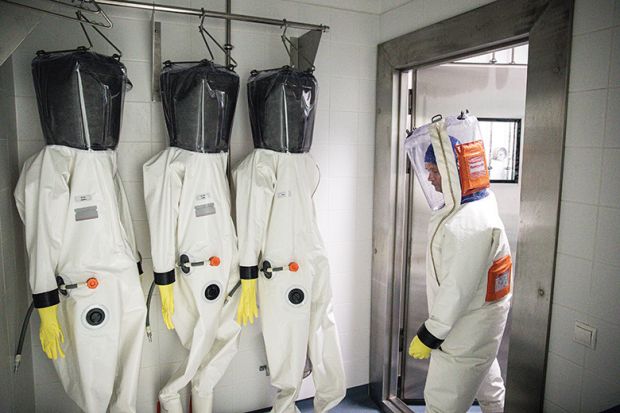Scholars working on medical research related to Covid-19 have revealed how their academic lives are being affected by the need to protect their personal health, from cancelling conferences to training colleagues to take over vaccine trials.
The pandemic has had a huge impact on the way academics across all fields have been working and living, but public health scholars have spoken of the additional burden of personal responsibility that comes with researching a Covid-19 vaccine and treating coronavirus patients.
Hannah Cheeseman, who is working on Imperial College London’s Covid-19 vaccine trial as head of the institution’s core immunology laboratory, told Times Higher Education that her team, who are working on clinical trial samples, sit in a different office from the rest of the vaccine research group.
Keeping the groups separate means that her team will still be able to operate if someone in the rest of the group falls ill, but it also enables colleagues to take over the important trial work in the worst-case scenario that her entire team must go into quarantine.
“If my team went down or had to self-isolate for two weeks, it would be really detrimental to the outcome of the vaccine trial,” she said.
“Training other staff members is something we’ve taken a lot more seriously so that if one of my team does get ill and anybody they’ve been in contact with has to self-isolate, then we can put other team members in place to keep the vaccine trial going. That’s something that we would have never really thought about before – you might think about what if one team member is ill, but we have to think about what if the whole team has to self-isolate.”
Dr Cheeseman added that she thought vaccine experts would be among the last group of academics to start networking again. A major international HIV vaccine conference that had been postponed from October to January 2021 has already been switched from an in-person meeting in South Africa to a remote event.
“I think we’re already being a lot more cautious than everybody else,” she said. “I think [the organisers] felt it would have been really irresponsible to hold it – 2,000 vaccine experts in one place is not the best plan.”
The responsibility of working on research that the entire world is waiting for has also affected decisions that Dr Cheeseman makes in her personal life. While her family and friends have not had any qualms about going abroad, she said leaving the UK “is not something I would even consider at the moment”.
“I didn’t want to be responsible for spreading it into a different country or picking it up in a different country and bringing it back here. And equally, I didn’t want to go to a different country and suddenly find that the quarantine rules changed, because I just can’t afford to self-isolate for two weeks on return…I need to be back in the lab and talking to the team,” she said.
Jeffrey Lazarus, head of the health systems research group at the Barcelona Institute for Global Health and associate research professor at the University of Barcelona, is an HIV and viral hepatitis expert whose research has shifted towards Covid-19 since March. He said many doctors have been asked to forswear academic conferences.
“What if 3,000 cardiologists are at a conference and there’s a Covid outbreak? There’s a personal fear and a feeling that it’s not responsible to go to a meeting with a whole bunch of specialists from your field in case something happens there, and then hospitals are saying you simply can’t travel because we need you in case something happens here,” he said.
Register to continue
Why register?
- Registration is free and only takes a moment
- Once registered, you can read 3 articles a month
- Sign up for our newsletter
Subscribe
Or subscribe for unlimited access to:
- Unlimited access to news, views, insights & reviews
- Digital editions
- Digital access to THE’s university and college rankings analysis
Already registered or a current subscriber? Login








